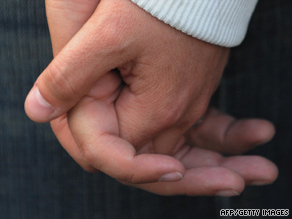

(CNN) -- Members of one of the country's largest Protestant denominations stepped up to microphones Friday, pleading with each other over a decision that could have ripple effects throughout the nation.

Current Evangelical Lutheran Church policy allows gay and lesbian clergy, lay people to serve only if celibate.
The question: whether the Evangelical Lutheran Church of America (ELCA) will accept non-celibate clergy members and lay leaders who are in same-sex relationships.
The 1,045 voting members of the 4.6-million member church supported a resolution Friday allowing congregations to support same-sex relationships among church members. But the question about clergy loomed as the debate broke for lunch.
Current church policy allows gay and lesbian people to serve as clergy members and lay leaders only if they are celibate.
Some members meeting at a convention hall in Minneapolis, Minnesota, argued that changing that would fly in the face of religious teachings.
"Brothers and sisters, I ask you, before you dig yourselves deeper into this hole, if you are so absolutely certain that these behaviors are not sinful that you are willing to place yourselves and this church at the spiritual risk that comes from encouraging sin," said Pastor Steven Frock of the Western Iowa Synod.
Among those on the other side was Alan Wold of the Northern Illinois Synod. "If according to some I am going to be in err for supporting this... Let me err on the side of mercy, grace, justice, and love of neighbor. Let me err on the side of gospel which makes all things new."
Many fear the emotional debate could tear at the unity of the church. So the members voted to re-order their resolutions -- moving to the top a resolution that the church "commit itself to bear one another's burdens, love the neighbor, and respect the bound consciences of all." It passed with overwhelming support.
Other religious denominations, including Episcopalians and Unitarians, have made moves to accept gay clergy, and Evangelical Lutherans would not be the first to accept those openly in same-sex relationships, said David Masci, a senior researcher at the Pew Forum on Religion and Public Life. But ELCA would be the largest to make such a move.
The church is the third largest Protestant denomination, representing 2 percent of the U.S. population, according to the Pew Forum.
The battle Friday was the latest in what Masci said many "socially moderate" denominations, including those in Judaism, are grappling with: balancing the growing acceptance of same-sex relationships with traditional teachings.
As some have moved toward accepting same-sex relationships, within those same denominations "you see more conservative wings that are pushing back against it," said Masci.
On hand for Friday's debate were hundreds of "interested parties" -- including some people who are not members of the church, said John Brooks, ELCA spokesman.
When asked whether there had been protests or rallies on either side outside the convention site, he responded, "Interestingly, no."
In the convention hall, Brooks said, "The debates haven't been rancorous or mean-spirited in any way. They've been quite civil. But people have been passionate with their feelings."
The vote will entail two resolutions involving clergy. The first calls on the church to commit to "finding a way" for people in "life-long, monogamous, same-gender relationships to serve as rostered leaders of this church."
The second is an extensive resolution laying out what Brooks described as "a process for getting the policy re-written" -- including a system for respecting that some congregations will maintain an "expectation of celibacy" for gays and lesbians.
It could take months for the process to be established, Brooks said.
Either way, church officials are braced for fallout.
Pastor Terri Stagner-Collier of the Southeastern Synod said a vote in favor of the resolutions would cause members of her own family to leave the church. Her sister "felt her church was being ripped away from her," Stagner-Collier said tearfully, adding, I urge you not to do this to all of those people in the pew and in my family."
Sara Gross of the Oregon Synod said some "dear members" of the church will be lost if the resolution passes. But, she said, "A vote to reject this recommendation sends a message to the world saying 'not all are welcome.'"
In a "changing world," Gross argued, the Evangelical Lutheran Church of America "needs to be a voice that stands up and says 'yes.'"
All About Lutheran Church • Gay and Lesbian Relationships • Religion
 Sit tight, we're getting to the good stuff
Sit tight, we're getting to the good stuff| Most Viewed | Most Emailed | Top Searches |